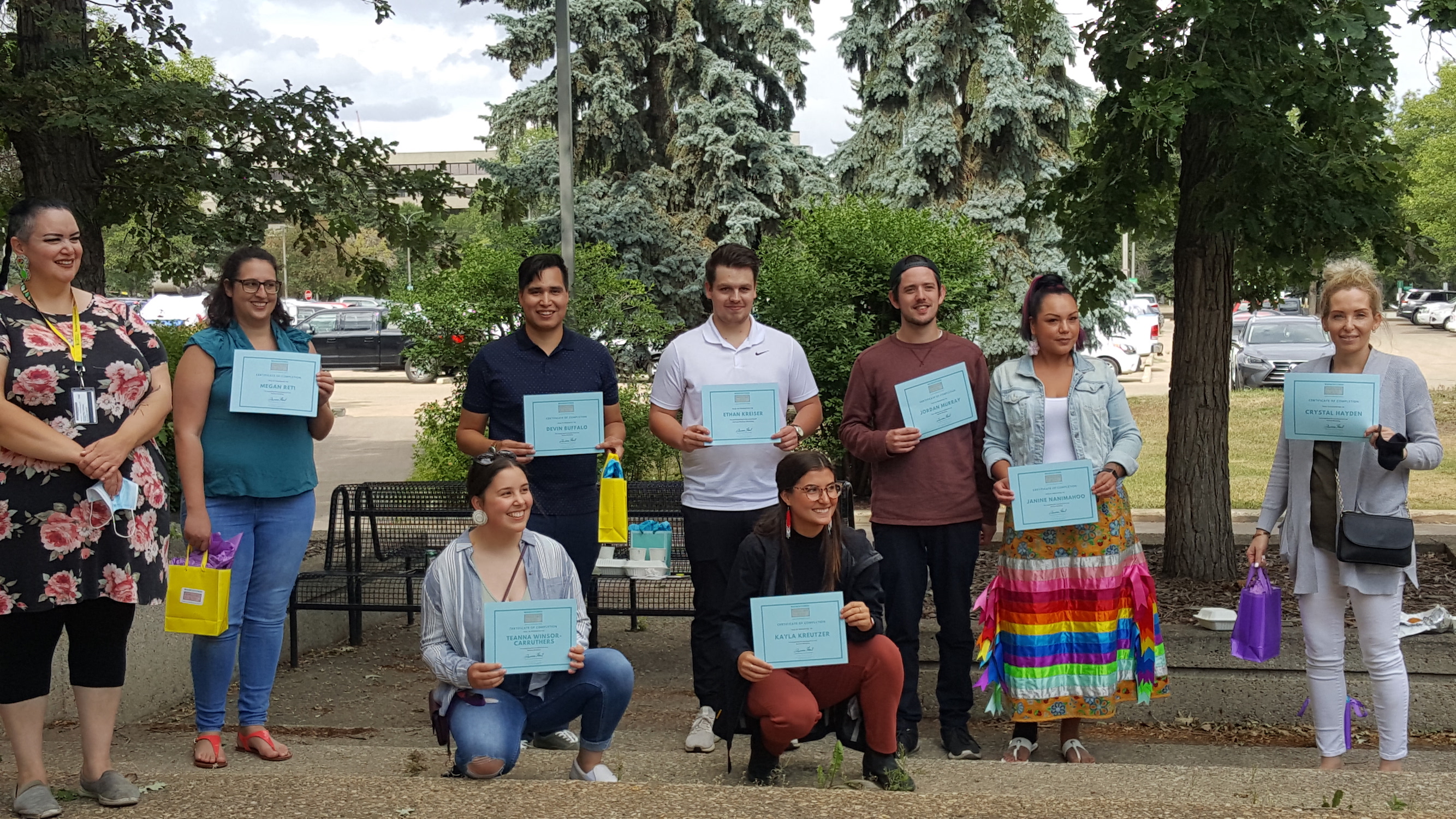Launchpad Into Law teaches Indigenous law students about Indigenous legal traditions
Helen Metella - 24 August 2021

Left to right standing: Indigenous Support Manager Tamara Pearl, students Megan Reti, Devin Buffalo, Ethan Kreiser, Jordan Murray, Janine Nanimahoo and Crystal Hayden. Front row: Students Teanna Winsor-Carruthers, Kayla Kreutzer
A new program at the University of Alberta that familiarizes first-year Indigenous law students from across the country with Indigenous laws before they begin studying Canadian common law has received high praise from its first class.
During the Wahkohtowin Law and Governance Lodge’s Launchpad Into Law Summer Workshop Series,15 incoming students from the University of Alberta, University of Calgary, University of Saskatchewan learned how to apply an "Analytic Framework" to Indigenous laws that included Cree stories. They also learned core legal skills including developing case briefs.
Janine Nanimahoo, ‘24 JD, says the six classes were highly informative, since she did not learn about treaties or Indigenous law while growing up on Big Stone Cree First Nation north of Slave Lake.
“Our Indigenous law ways of being were never acknowledged when I was in school as a child and teenager,” she said. “Nothing Indigenous was ever mentioned in school. First Nation people were never seen as important as the white people were.”
Nanimahoo started becoming aware of treaties and Indigenous law while earning her master’s in Indigenous Peoples Education, and learned much more about them while working as a literacy specialist for Treaty 8 First Nations, following her university studies.
Strengthening her understanding of Indigenous law before law school starts has helped her believe that there is a place for her lived experience in the legal profession, she said.
“We are so used to being told how it should be for us as First Nation people, so used to being told you can’t do it your Cree way, it has to be this way: ‘boom, boom, boom,’ ” she said. “And in all reality, as a First Nation person, that’s not how it is. There are steps, it takes time, nothing goes boom, boom, boom. For us, there’s so much more that needs to be thought about and considered — it all goes back to relationships.”
Engagement skills
Getting a grounding in Indigenous legal traditions before learning about Canadian common law helps students counterbalance the dominance of Canadian law, said Tamara Pearl, the Faculty of Law’s Indigenous support manager and an assistant lecturer. She created, designed and instructed the course in consultation with Indigenous legal scholars at the U of A’s Wahkohtowin Law and Governance Lodge.
By introducing Associate Professor Hadley Friedland’s Narrative Analysis Method, which is used in community engagement training, students learned “respectful community engagement with their own peoples' legal orders,” said Pearl.
For Launchpad student Jordan Murray, ‘24 JD, who grew up in Nanaimo and only began learning about his Alberta Métis heritage in recent years, those engagement skills “are going to be valuable in learning more about my culture and how it can continue to develop in Canada.”
Both Murray and Nanimahoo said testing out those skills during the final moot staged near the end of the course was a highlight. The moot featured a composite fact-pattern of real issues commonly encountered in Indigenous communities. The students also stressed how important Launchpad was in building relationships with fellow Indigenous classmates and in building confidence as they prepare for a profession where Indigenous lawyers are still in the minority.
“I never thought I’d be accepted into law school,” said Nanimahoo. “Reading cases and stories, the program gave us a heads-up. ‘You’ll have this writing course, this is the tone of reading you’ll do.’ It reassured us that it is doable. If I didn’t participate in Launchpad, I would very much feel isolated, feel very much alone.”